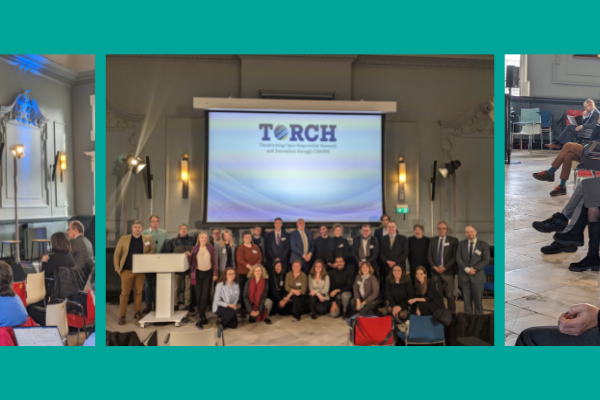On 8 March 2023, Trinity College Dublin hosted the 2nd TORCH Annual Forum focusing on common R&I policies and strategies. Bringing together representatives of diverse national and international actors within the European research and innovation landscape, the event provided an excellent opportunity to discuss challenges and progress regarding some of the key R&I areas.

Connected to the research and innovation dimension of CHARM-EU, the TORCH Annual Open Forums provide a channel to share and discuss results and achievements regarding research and innovation collaborations between universities and beyond. Under the title ‘Sharing Common R&I Policies and Strategies: Strengthening Collaboration Towards a Transformational Approach’ the 2nd TORCH Forum encouraged reflection on five key R&I areas: research assessment reform; fostering equality, diversity and inclusion in research; championing open science; promoting inter- and transdisciplinary research and fostering R&I cooperation between universities.
The event was addressed to a diverse group of stakeholders involving university leadership, academic and administrative staff, policymakers and all actors and organizations engaged in R&I activities. More than 120 participants attended the different sessions, in which 61 chairs, speakers and rapporteurs took part representing European and national organizations as wells as 15 European University Alliances.
Cooperation and the European perspective on research
The Forum was opened by Provost Linda Doyle (Trinity College Dublin) welcoming the participants and highlighting the vital importance of collaboration between universities. Following her speech, Vice-rector Jordi Garcia (University of Barcelona) summarised the priorities of TORCH for the second stage of the project and emphasized the role of interdisciplinary research in tackling global challenges as well as the importance of best practice exchanges among alliances. The opening ceremony was closed with the presentation of Dr. Kate Morris (Head of Campus Engage, Irish Universities Association) focusing on addressing societal challenges through engaged research and innovation.
Following the ceremony, the plenary session on the ‘ERA Policy Agenda 2022-2024 and R&I Cooperation Between European Universities’ put together a diverse panel with speakers discussing the role of alliances as innovative living labs within the ERA framework. Representatives of stakeholders involved in the co-creation process – such as the Coimbra Group, the European University Association, Science Europe and Technopolis Group – shared their perspectives on the ERA Policy Agenda. They identified linkages between the different Policy Actions, emphasized the importance of having diverse stakeholders involved in their development and implementation and highlighted the areas that could be the most relevant for European University Alliances.
The panel session on ‘The European perspective on the reform of research assessment’ presented the latest approaches and progress on the revision of the evaluation systems for research performing institutions, researchers, and funding agencies, with all the participants agreeing on the need to reform. The roadmap established by the Coalition for Advancing Research Assessment (CoARA) was also discussed, and the session included the perspective of the European Commission (DG RTD) as well as the Irish Health Research Board (as a national funding agency), the European University Association and CHARM-EU partner Utrecht University.
Sharing best practices and initiatives between alliances
The cluster sessions of the event focused on the progress made regarding the joint R&I strategies of European University Alliances and provided an opportunity for exchanging experiences and best practices among them.
Within Cluster 1 on ‘New approaches for diverse academic careers’, six Alliances (CHARM-EU, ARQUS, FORTHEM, YUFE, CIVIS, and EPICUR) shared their progress and plans to promote Open Science and intersectional initiatives regarding equal opportunities, non-discrimination and inclusivity, while also presenting some specific actions and strategies on reforming research assessment.
In Cluster 2 titled ‘Intensifying R&I cooperation between universities’, eight examples of initiatives building collaborative frameworks for joint and shared R&I-related activities were shared. FORTHEM, EELISA, SEA-EU, UNIC, ECIU, CIVIS, and CHARM-EU presented diverse cases, from the creation of joint research support offices to sharing research infrastructures or setting up networks of TTOs. Speakers agreed on the need to keep developing collaborative frameworks across higher education institutions.
Cluster 3 focused on ‘Promoting inter/transdisciplinary research driven by societal challenges’ where good practices and strategies on exploring joint, transdisciplinary and challenge-driven research were discussed. Representatives of CHARM-EU, EC2U, FilmEU, Circle U, CIVICA, Una Europa, and FORTHEM put forward their Alliances’ respective plans to support inter/transdisciplinarity.
Promoting open science and shaping the future of European research
Last but not least, the afternoon panel session titled ‘University with and for Society: promoting Citizen Science within Open Science’ brought together representatives of different CHARM-EU universities (Åbo Akademi University, Julius-Maximilian Universität Würzburg, Hochschule Ruhr West, and the University of Barcelona). Speakers discussed institutional plans and support systems to foster Citizen Science and presented some hands-on experiences and participatory projects involving citizens, local communities and the wider society as co-creators, while pointing out strengths and potential caveats when implementing citizen science research.
The Second TORCH Annual Forum was closed by Prof. Brian Broderick, Associate Dean of Research at Trinity College Dublin, who highlighted that by collaborating to shape its future, alliances can play an important role in the transformation of European research.
TORCH has prepared an open access report on the development of the event including the presentations and debate around common R&I policies and strategies. You can download the report here. The plenary and panel sessions of the event are publicly available on CHARM-EU’s YouTube channel:
Event gallery: